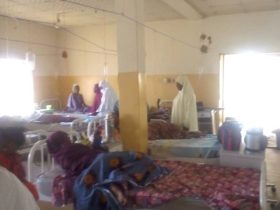 American Billionaire said that a global research effort worth tens of billions of dollars is needed to ensure the world is better prepared for the next pandemic, which could be far worse than Covid-19The Guardian reports that the Microsoft founder said the “completely horrific” death toll and economic damage inflicted by coronavirus should drive funding into projects aimed at improving vaccines, treatments and diagnostic tests that will be needed to contain the next pandemic more effectively.
American Billionaire said that a global research effort worth tens of billions of dollars is needed to ensure the world is better prepared for the next pandemic, which could be far worse than Covid-19The Guardian reports that the Microsoft founder said the “completely horrific” death toll and economic damage inflicted by coronavirus should drive funding into projects aimed at improving vaccines, treatments and diagnostic tests that will be needed to contain the next pandemic more effectively.
In an interview with the former UK health secretary Jeremy Hunt for the Policy Exchange thinktank, Gates said research and development budgets should focus on weaknesses exposed by the rapid spread of Covid around the world. “You know, we didn’t have vaccines that block transmission. We got vaccines that help you with your health, but they only slightly reduced transmission,” he said. “We need a new way of doing the vaccines.”
Gates said it would take ‘tens of billions in research and development’.Covid-19 vaccines partially block transmission of the virus but are more effective at preventing severe disease. The vaccine effectiveness expert panel that feeds into the government’s Sage committee estimates that protection against infection is 65% after two shots of AstraZeneca and 75% after two doses of Pfizer, with both offering about 95% protection against hospitalization. The immunity wanes over time, however.
Gates also lament the lack of effective treatments for Covid-19 adding that while the steroid dexamethasone and the new antiviral drug molnupiravir could help, the impact of therapeutics was “way less than should have been the case”. He further criticized the failure to get diagnostic testing up and running to the point that it could dramatically keep death rates down.
Gates, who had warned in a 2014 Ted talk that the world was not ready for the next pandemic, said he hoped to write a book in five years’ time about how the world was now prepared for the eventuality. “It’ll take tens of billions in research and development,” he said, “and probably about a billion a year for a pandemic taskforce at the WHO [World Health Organization] level”.
The WHO taskforce would perform pandemic surveillance and run what Gates called “germ games” where countries practice responses to events that could spark the next crisis, such as a bioterrorist unleashing smallpox at 10 airports.
“There’s naturally caused epidemics and bioterrorism-caused epidemics that could even be way worse than what we experienced today,” Gates said. “And yet the advances in medical science should give us tools that, you know, we could do dramatically better. So you’d think this would be a priority. The next year will be where those allocations have to get made, including this global pandemic taskforce.”
A lot of the work needed to prepare for the next pandemic involved making vaccines cheap, having big factories to manufacture them, and “eradicating” influenza and the common cold, Gates added. Vaccines could be “just a little patch you put on your arm” and would be “incredibly beneficial” even outside a pandemic, he said.
“Along with the climate message and the ongoing fight against diseases of the poor, pandemic preparedness is something I’ll be talking about a lot,” Gates said. “And I think it’ll find fertile ground because, you know, we lost trillions of dollars and millions of lives. And citizens expect their governments not to let that happen again.”









3 Comments